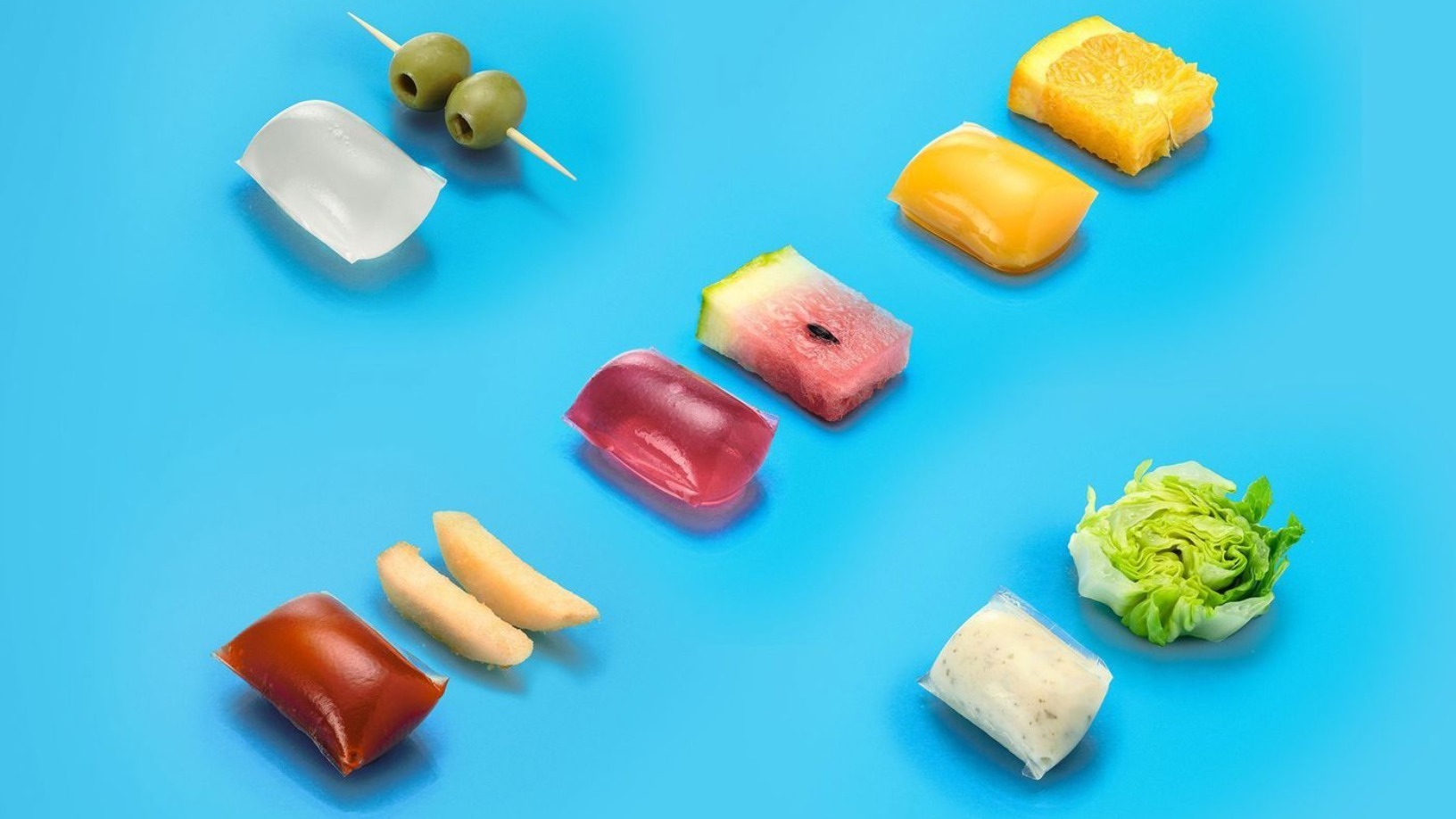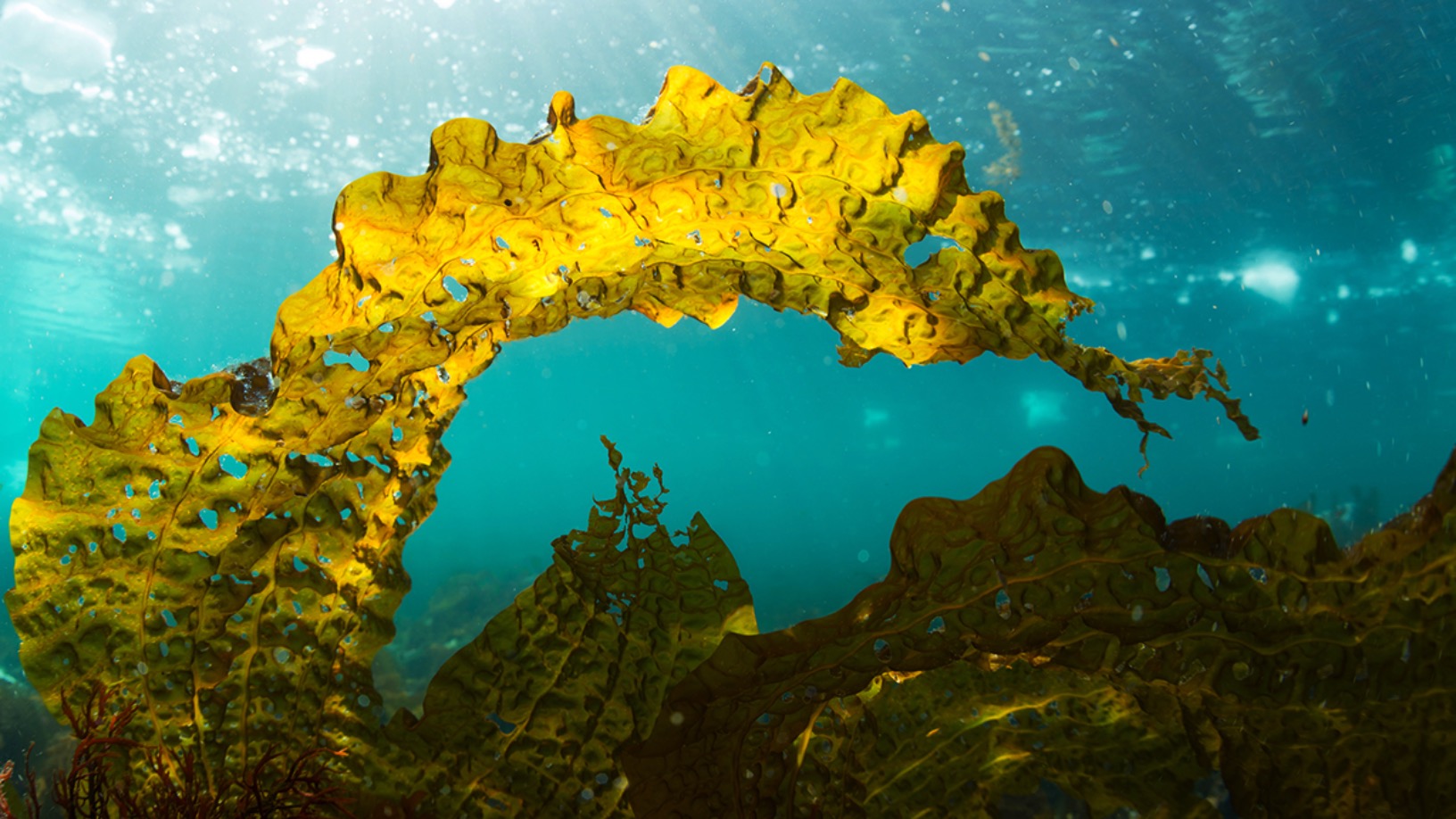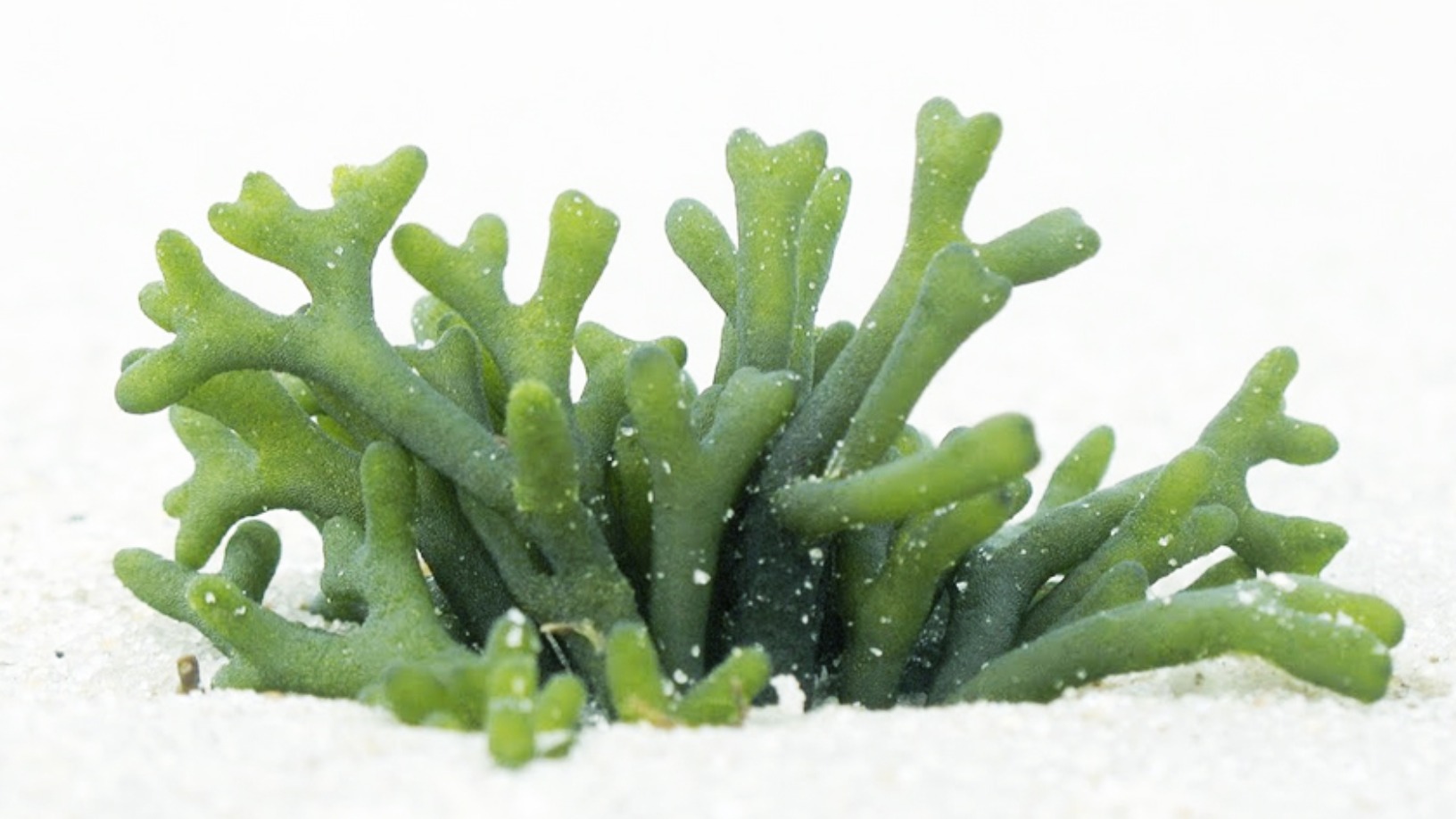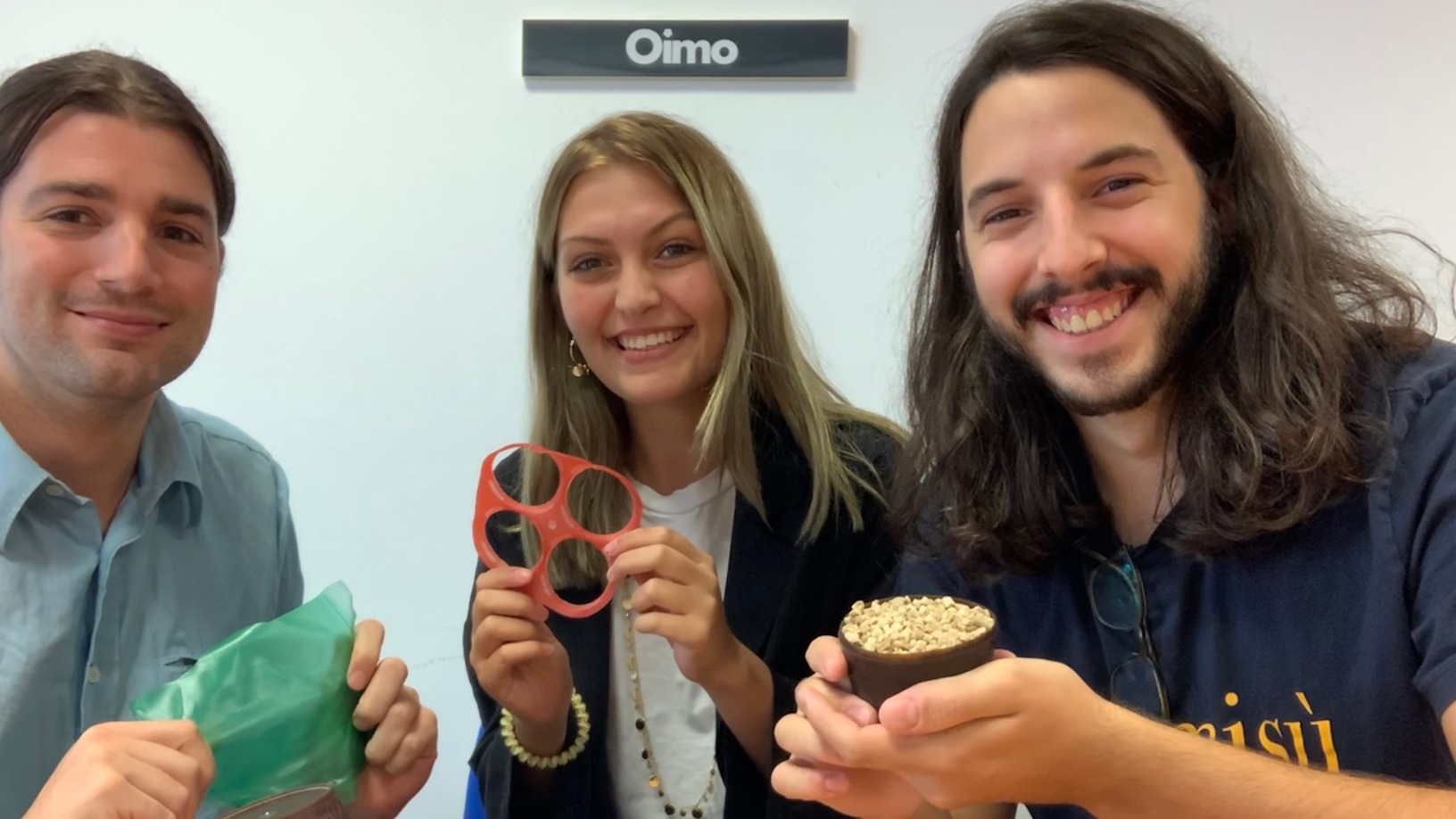As more plastic waste is being dumped into the ocean, the ubiquitous seaweed is also fast becoming an environmentally sustainable substitute for single-use plastic – coming full circle.
Seaweed is not only a protein-rich ingredient; it’s also a compostable alternative to plastic. Hence it’s increasingly used to produce eco-friendly food packaging. In London, two young postgraduate students have given the algae a designer makeover, transforming the plant-based packaging membrane into edible sachets or pouches that can be filled with food and beverages like sauces, fruit and energy drinks.
French engineer Pierre-Yves Paslier and Spanish product designer Rodrigo García González began experimenting with algae and other plants in 2014 to create a sustainable material that could be scaled commercially for industrial applications. After graduating with master’s degrees from Imperial College and the Royal College of Art in London, they founded Skipping Rocks Lab as part of an incubator project of Imperial College. The startup was rebranded in 2019 as Notpla, meaning “not plastic.”
"It's all about impact. We started this because we wanted to be part of a solution to this plastic crisis," said Paslier, who previously worked as a packaging engineer at L’Oréal. It took nearly three years of R&D and iterations to create their first product, Ooho, named after the sound made by people when they saw the product for the first time.
Ooho is an edible transparent sachet made only from seaweed and other plants. The capsules can be chewed to release the food or drink contents inside. They can also be discarded and allowed to decompose naturally in less than six weeks.
Thousands of Ooho seaweed pouches have been filled with water or energy drinks like Lucozade to make edible water pods and hydration capsules for distribution at sports events like the London Marathon and various festivals around the city. The sachets were also used to produce alcohol bubbles or capsules for special events by whiskey company Glenlivet and for sauce maker Hellmans.
Replacing Teflon liners
In July 2020, Notpla raised £4m in a seed funding round led by international VCs such as James Murdoch’s Lupa System and Belgium’s Astanor Ventures. The round also attracted new investors like Torch Capital and previous early investor Sky Ocean Ventures. The funds were used to develop Notpla’s new line of compostable liners and to expand the sustainable packaging business into new markets outside the UK.
Notpla uses proprietary biotechnology to combine seaweed sourced from northern France with calcium chloride to extract sodium alginate, the sodium salt form of alginic acid and gum. All traces of odor, taste and color are later removed. The result is a very thin, transparent jelly membrane that can be heat-sealed into an edible pouch. The startup’s co-founders reckon that the Ooho sachet has up to 90% less carbon impact than the plastic equivalent.
Seaweed “is one of the resources that is the most abundant; you don't need fertilizer, you don't need to put water on it, and it's a resource we have been using for a long time," García said. "One of the seaweeds we use grows up to 1 meter per day.”
The biotech applications have been further scaled beyond the bite-sized pouch. In February 2021, Notpla announced the launch of compostable, water- and grease-resistant liners developed from tree and grass pulp. Covered with Notpla’s special plastic-free coating, the liners can be used in takeaway containers that are currently coated with PTFE, better known as Teflon, which makes them nearly impossible to decompose.
The Teflon legacy in industrial applications has lasted more than 80 years, a domination Notpla aims to challenge. The startup is commercially producing liners as safer substitutes of the Teflon-coated boxes used by over 30,000 restaurants affiliated with Just Eat in the UK. Teflon coatings are generally safe but above 570°F (300°C), Teflon starts to break down, releasing toxic chemicals.
“Over half a billion plastic boxes are used across the takeaway industry every year and we know that, eventually, they end up in landfill,” said Andrew Kenny, MD of JustEat. Notpla and the food delivery company had previously run a pilot using over 46,000 edible Ooho sachets as containers for various sauces.
However, the long-term objective is to lease out Notpla’s manufacturing machinery to corporate clients. The seaweed-based materials will be sold in cartridges to facilitate on-site production of the edible sachets and other compostable packaging to optimize on-demand production according to each customer’s needs.
EU bans single-use plastic
Sales reached £292,000 in 2019, according Notla’s Crowdcube crowdfunding campaign in March 2020. Over 400,000 edible Ooho sachetshave been produced and distributed at various sports events, thanks to a key partnership with Lucozade Ribena Suntory and other festival event organizers in London. Other key clients include Unilever and Mars.
In July 2019, an EU directive came into force to start banning single-use plastics like food and beverage containers, plastic bags, packets and wrappers. Items being targeted also include plastic cutlery, plates and straws. The EU buys about 48m tons of plastic a year, of which packaging makes up for 40%, according to research by Deloitte published in 2017.
Industries are hence hard pressed to review their operations and adjust their supply chains to align with the new EU initiative. In particular, food delivery services have also been growing at an unprecedented scale in recent years, drastically ramping up demand for takeaway containers. The situation has been further exacerbated by the Covid-19 pandemic, forcing many F&B outlets to switch back to single-use plastic packaging due to health concerns. Less than 30% of post-consumer plastic waste are collected for recycling, hence the urgent need for sustainable packaging solutions.
As a result, food delivery companies like Just Eat are actively looking for new sustainable forms of packing and delivering meals to customers’ doorstep. Foodpanda in Hong Kong has started offering free door-to-door plastic recycling services. In Singapore, BarePack has partnered with popular food delivery operators to provide reusable food containers to eco-conscious consumers.
Notpla’s game-changing seaweed packaging applications offer sustainable green solutions to both food and non-food industries. The startup is looking to close new partnership deals with packaging manufacturers to expand the range of alt-plastic solutions for current and new products in its portfolio, including flexible film.
“Once we have these relationships established, we should be able to grow sales quickly as we have significant interest from retailers across Europe, and hopefully in the US at some point too,” Notpla COO Lise Honsinger said.















